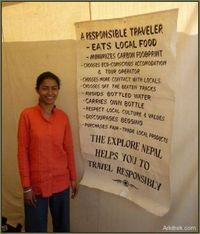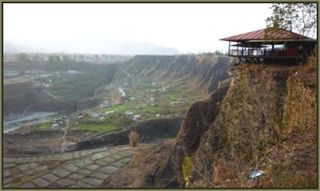Travelling to remote places and peoples can help regenerate local communities. But it can also have adverse effects, and needs recognition to make it best appreciated. Ian Hall reports from a special ecotourism conference held in Nepal.
Pokhara, Nepal, 8 March 2011. At the recent PATA Adventure Travel and Responsible Tourism Conference in Pokhara, Nepal, one of the topics was “Indigenous Tourism'. This area of discussion sparked a lively debate and aroused much emotion. Taken at face value, much of community-based tourism is also indigenous tourism. But it isn’t always to the benefit of the visited.
One person from the audience asked, "What happens if tourists overstay their welcome?"
The answer of course is that if indigenous people are full participants in the industry then the product they sell will be on their terms. So if tourism is not the boss then they won't be under pressure to accede to more demands than they are comfortable with.
Another forum member presented a personal experience of visiting a Berber cave dwelling community in Tunisia. In this case the community were not full participants at all and depended on tipping from tourists - while the tour operator took all the fixed tour fees. Not a good outcome by any means.
The challenge for indigenous tourism, asserted John King of Global Tourism and Leisure, Australia, is to develop tourism products based on indigenous culture which do not relegate the people being visited to providing 'background light and colour.' "Don't let tourism become the boss," he advised. He suggested that mature urban-based tourists miss and want to know about indigenous philosophy on nature and natural resources. Provide these, he says, and the background light and colour will come more naturally and genuinely.

Explore Nepal Group shares the path to responsible tourism
At the conference, all the speakers gave inspirational presentations on the Responsible Tourism (RT) theme and forums were well attended by knowledgeable delegates. But it still seems the practice of RT has yet to catch up with the preaching. Trade booths were dominated by standard adventure travel offerings, with not much RT presence. There were one or two notable exceptions however.
Three Sisters Adventure Trekking Company is going for the big social issue of empowerment of women by providing all female trekking guides. The Explore Nepal Group also got into the spirit by decorating their booth with a wall painting and banner promoting RT principles and offering a range of products with an emphasis on architectural heritage, locally sourced food, and nature tourism.
Education was a strong theme at the conference. Feedback on my presentation on Arkitrek focused on this issue, about how Arkitrek engages architecture students to deliver community and nature based projects - yet at the same time provides experiential learning to all participants.
 Responsible tourism protects pretty but precarious resources.
Responsible tourism protects pretty but precarious resources.We're also all still learning about RT and in this respect the conference was an outstanding success in that it brought together thinkers, practitioners, verifiers and promoters in the field. I found it encouraging that there is both consistency in understanding the principles of RT and huge diversity in how to implement it.
Further to the promotion of RT in the region, the Responsible Tourism Initiative from Wild Asia helps to educate and recognise good practice as low cost carriers and a surge of new travel destinations bring more tourists to more remote places every year. It accepts there are concerns over the negative impacts on the environment, local communities and wildlife, and runs a yearly Awards program called the Responsible Tourism Awards, now in its sixth year.
“It is important that we all consider our impacts on the environment and choose our accommodations carefully so that we do not lose the cultural and natural gems that tourists come to Asia for in the first place”, says Dr. Reza Azmi, director and founder of Wild Asia.
So if you are an individual who would like to find out more about responsible, sustainable tourism in Asia, or an operator who wishes to enter the awards, get involved. Mail rt@wildasia.org for details, or visit the WildAsia website – www.wildasia.org.
Text and photos courtesy of Ian Hall, director of Arkitrek Sdn Bhd. Ian is also a judge at Wild Asia Responsible Tourism Award and the lead organiser of Arkitrek Camp - a sustainable design & build experiential work camp in Sabah.